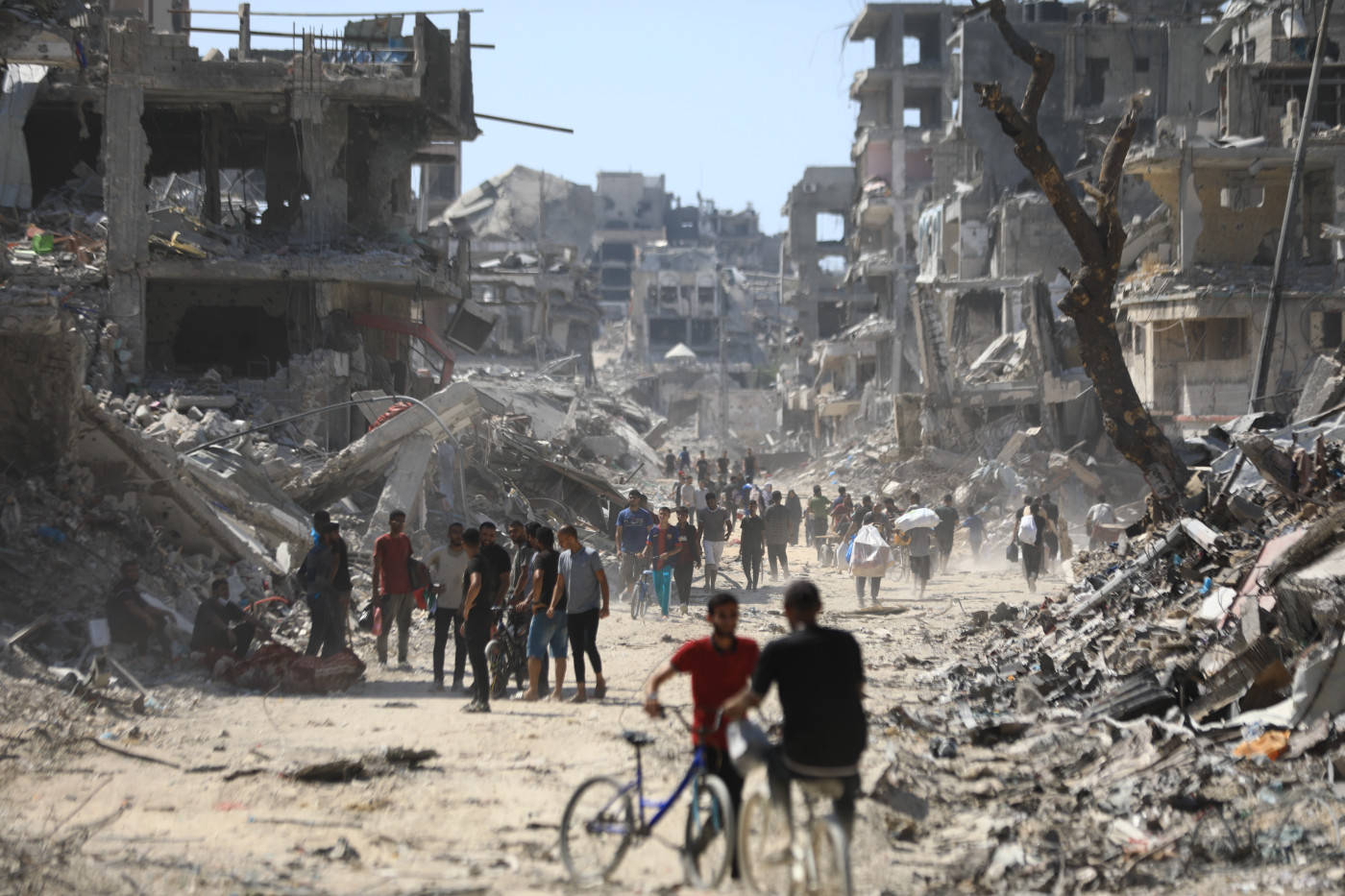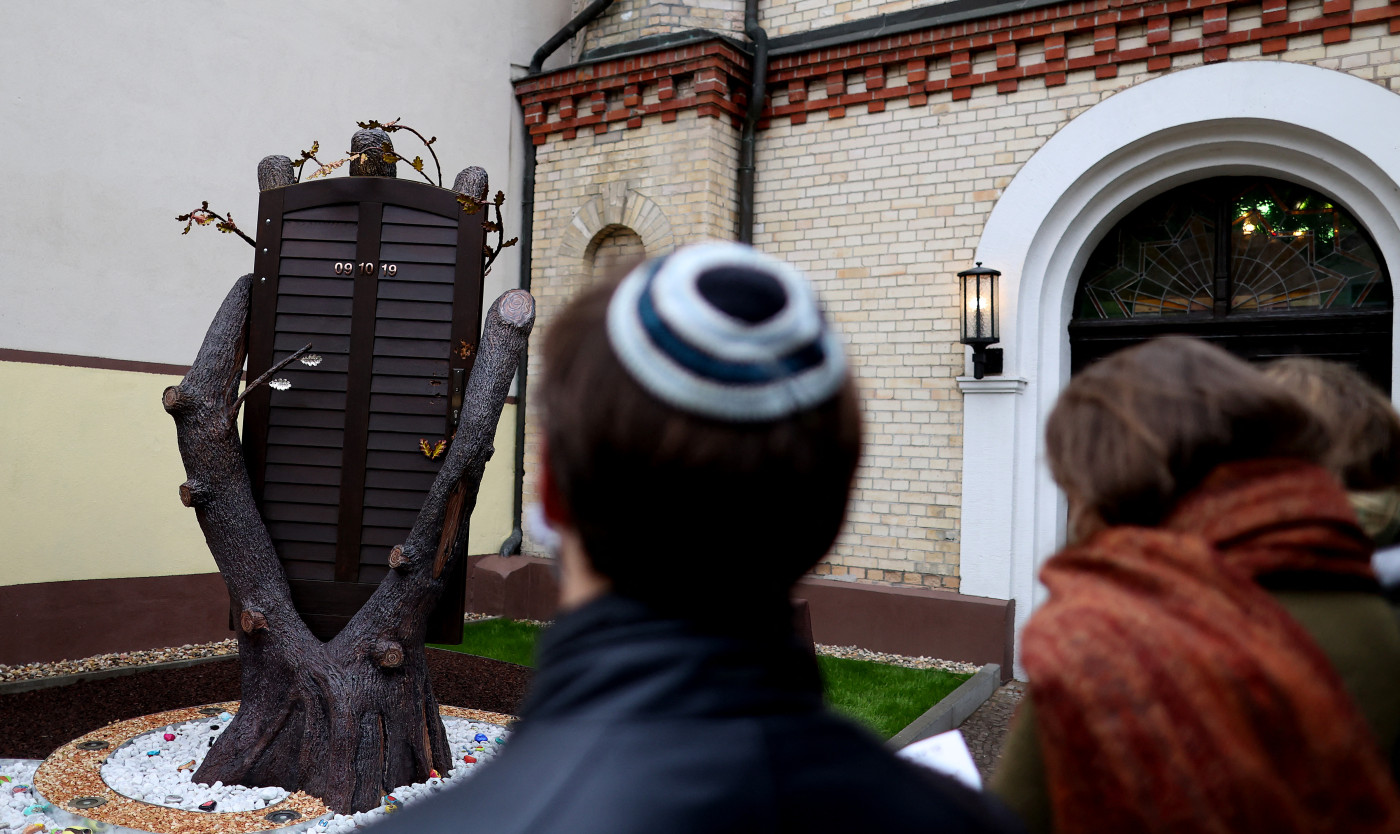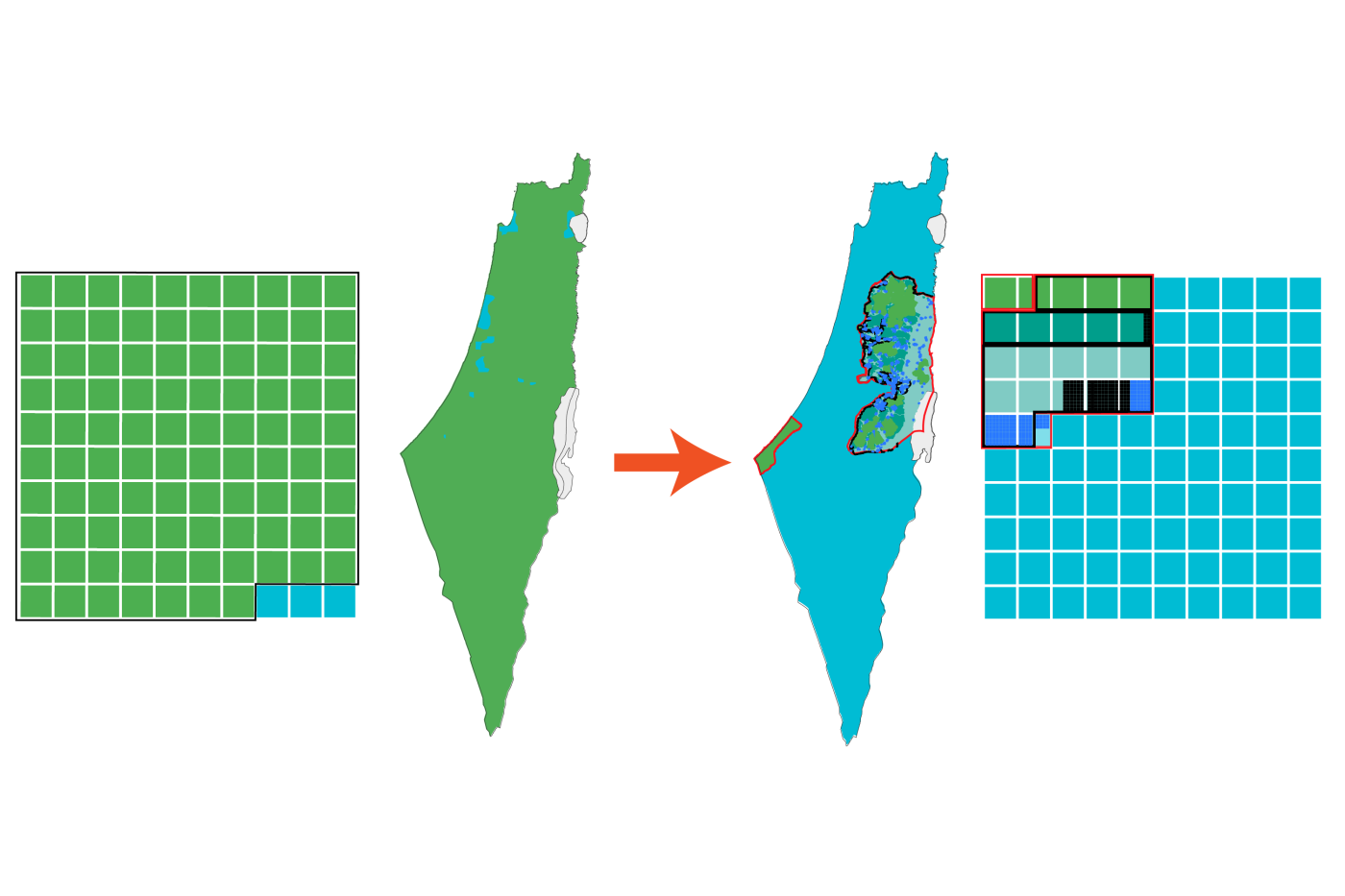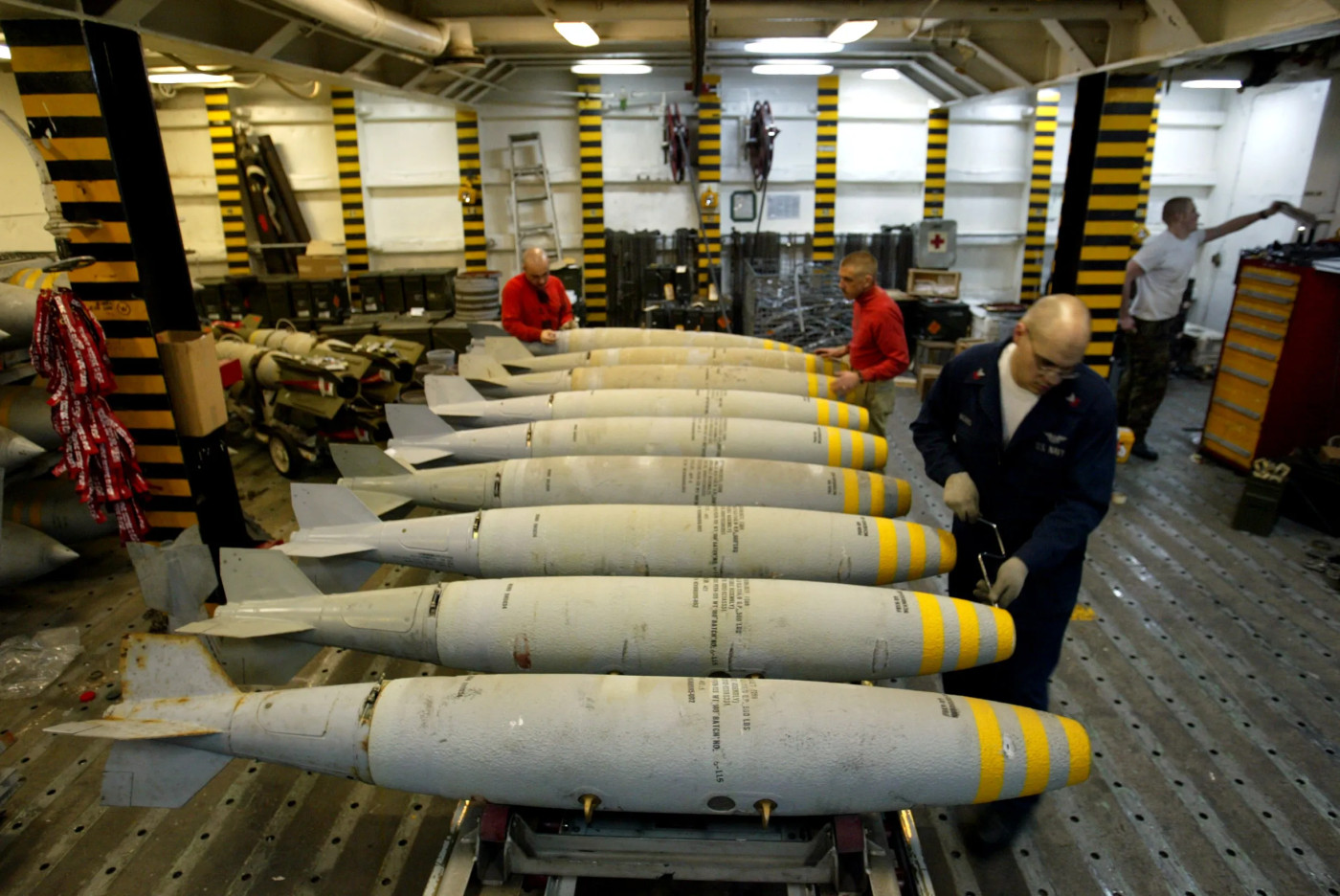Exclusive: Turkey's Erdogan Blasts Biden's US Over Ukraine and Gaza
Turkish President Recep Tayyip Erdogan accused U.S. President Joe Biden and his administration of complicity in atrocities in Israel's war in the Gaza Strip and rounded on the United States and other NATO allies he said had "fueled the fire" of war in Ukraine.
Erdogan made his comments, some of his strongest criticism of the Biden administration to date over the conflicts, in response to written questions from Newsweek as he arrived in Washington, D.C. to attend a NATO summit at a pivotal time for the international order.
Erdogan, who has led the nation formally known as Türkiye for more than two decades and is widely considered to be its most powerful leader since founding father Mustafa Kamal Atatürk, is in a unique position geographically and geopolitically among fellow NATO leaders. Not only does Turkey constitute the U.S.-led alliance's second largest military but the nation straddling Europe and Asia finds itself flanked by two major conflicts raging in Ukraine and Gaza.
But as the Biden administration seeks NATO unity in attempting to bring about Russia's defeat in Ukraine and offers staunch support for Israel's offensive against Hamas and a coalition of Iran-aligned forces across the region, Erdogan has a different outlook. He accuses Western allies of fanning the flames of war in Ukraine and Biden, in particular, of complicity in human rights violations in Gaza.
The exclusive comments come as Erdogan is also increasingly looking to diversify Turkey's international ties by building closer relations with emerging blocs in the East. And while the Turkish leader affirms his commitment to further develop ties with Washington, he made clear that Ankara's concerns could no longer be ignored.
Newsweek: You're in DC now attending this NATO summit at a critical time for the alliance with serious questions emerging over the future of the ongoing Russia-Ukraine war. As the second-largest military in the alliance and the only member in the Middle East, what is your message today on behalf of Türkiye?
Erdogan: Türkiye is an important member of NATO and actively contributes to the alliance's operations and missions. Our primary objectives are to fortify our solidarity with our NATO allies and to find sustainable solutions to the challenges that confront the world and our region, utilizing common sense. In a changing world, new problems emerge with each passing day. Thus, we believe that NATO must be prepared, determined, and strong.
As we consistently underscore at NATO meetings, terrorism is one of the most critical global issues. We are a country that has taken on the mission of fighting terrorist organizations without discrimination and has actively demonstrated this in the field. Our main expectation from our allies is that they will adopt a similar counter-terrorism approach.
Unfortunately, we have not received the expected level of support and solidarity from our allies thus far. We cannot tolerate this situation, nor is it consistent with the spirit of alliance, for the ringleaders of terrorist organizations that pose a threat to Türkiye's national security to be accepted as legitimate actors.
We take a holistic approach to these and similar security risks, providing sustainable solutions that serve not only our own security but also that of our allies. We do not commit the error of concentrating on a single issue while disregarding others. We believe that it would be better to adopt a principled approach to the problems in our region and the world rather than one based on subjective and short-term interests.
To what extent do you agree with Western NATO leaders who argue that Russia must be defeated in Ukraine and how concerned are you about the potential for a direct clash between NATO and Russia?
Right from the outset, we have declared that we will not be a party to this war. Our stance is exclusively in favor of peace. The solution is not more bloodshed and suffering, but rather a lasting peace achieved through dialogue. . This has resulted in more harm than good for Ukraine.
In contrast, we have engaged in dialogue with both warring parties in an effort to bring them closer to peace. By bringing the parties together in Antalya and Istanbul, we have facilitated the establishment of a critical avenue for dialogue to resolve the issues. Our Black Sea grain initiative and the grain shipments we made from there were far more than just an economic and logistical activity. We do not believe that limiting this war to either side's victory or defeat is the solution. We believe that the solution lies in dialogue and diplomacy.
It is obvious that shedding blood and destroying settlements will not bring lasting peace. On the other hand, the prospect of a direct confrontation between NATO and Russia is undoubtedly concerning. Any steps that could lead to this outcome must be deliberately avoided. We are of the opinion that it is appropriate to approach the matter with a solution-oriented approach and with restraint.
You have managed to engage in diplomacy with President Putin, including in Syria, Libya, the Caucasus region and even to some degree in Ukraine, despite being on opposing sides of these conflicts. How would you describe your relationship with President Putin, and to what extent do you feel you can still work with him today to achieve positive outcomes?
We adhere to a principled approach in all of the regions you have mentioned. We approach issues with sincerity and rational road maps rather than with codes from hidden agendas and emotional reflexes. We are moving forward by calling out what is right and what is wrong. It is impossible to proceed with such sensitive processes while acting like a bull in a china shop.
We do not develop a policy that is ensnared in prejudices; rather, we approach problems from a perspective that emphasizes reasonableness and solutions. Naturally, we do not agree with Mr. Putin on everything. However, we are able to discuss matters among ourselves and delve into the specifics of how to resolve them.
And then how would you describe your relationship with President Biden? There have been some strains in the U.S.-Türkiye relationship in recent years, including sanctions and differing views on various issues such as the Gülen movement and human rights. What direction are ties moving in?
First and foremost, the structure led by the FETO ringleader based in the United States is a terrorist organization, not an innocent movement. Just like DAESH, which has carried out terrorist acts in various parts of the world. Both DAESH and FETO are killing people. Both DAESH and FETO exploit people's religious feelings. Both DAESH and FETO aim to harm the countries in which they operate. FETO intends to infiltrate the governments of the countries where it operates and seize control of the system. This includes the United States.
With tangible evidence, we explained the hazards of this structure to the presidents of the United States. However, Mr. Biden and I have different views on this matter.
In addition, we have different views with respect to human rights. We believe that the brutal murder of innocent people by Israel in hospitals where they go for treatment, in ambulances, in marketplaces, in centers where humanitarian aid is distributed, and in areas defined as safe is the gravest violation of human rights. The US administration, however, disregards these violations and provides Israel with the most support. They do so at the expense of being complicit in these violations.
The fight against terrorism is another issue of concern. We are a NATO country. The threat to our national security is a threat to all NATO countries, especially the US. In fact, this is the situation as evidenced by the agreements that were responsible for the establishment and continued existence of NATO. However, the support given by the US and some of our other allies to the terrorist organizations PKK/PYD/YPG and FETO that threaten our security does not comply with these principles of NATO. We have expressed our concern regarding the weapons and support that these terrorists receive on every platform. We desire the support of our allies in the fight against these terrorists; however, we are unable to fully experience it.
There are some issues on which we disagree with the US. We do not see eye-to-eye on some issues. We can, however, agree on certain issues. We are, after all, two allied countries. We have developed a relationship with Mr. Biden in conjunction with the issues that we concur and disagree on between our countries. We can talk about a relationship that alternates between periods of tranquility and periods of turbulence. We have consistently maintained sincerity in our relations with Mr. Biden and have taken care to cultivate our friendship. Türkiye and the United States are two allies with a long history of relations. We have deep-rooted ties and we intend to develop them.
Given your diplomatic initiatives and Türkiye's geographical and geopolitical realities, you are in a unique position among NATO members. What do you see as the importance of Türkiye diversifying its global relationships and to what extent does this include stronger ties with non-Western powers such as China, Russia and emerging Global South nations? Is Türkiye, for example, considering becoming a full member of BRICS or the Shanghai Cooperation Organization?
It would be a mistake to approach all these issues with a Cold War-era logic. We are no longer living in Cold War conditions. The world has changed immensely, and Türkiye is a country that is aware of this change. We base our diplomatic relations on the "win-win" principle. We act with the mindset that the countries with which we have relations should also win. We are situated in both the East and the West. We are an unwavering NATO ally.
However, we do not believe that this impedes our ability to establish positive relationships with nations such as China and Russia. Nor do we think that the Shanghai Cooperation Organization is an alternative to NATO. Similarly, we do not consider BRICS to be an alternative to any other structure. We regard all of these structures and alliance grounds as formations with distinct functions.
There is hardly a state in the world today, including warring states, that does not have relations with each other. Building and developing relationships is a necessity for states. No explanation is needed as to the ultimate destination of a world in which all nations are confined to their own borders, where sharp poles are established. These bitter experiences are evident to those who study the two world wars in history.
In this respect, we are in a unique position. We preserve and strengthen our position as a reliable partner in all structures in which we are involved. That is why, as a NATO member, we do not consider it a problem to interact with countries in the SCO, BRICS, the European Union, or the Organization of Turkic States. We even believe that these relationships contribute to world peace.
Across Europe we have seen a rise in the popularity of far-right political forces and growing concerns over the erosion of democracy. Do you view these trends with concern or are their potential opportunities in working with these emerging political elements?
I have been advocating for this threat for years, not just in response to certain European election outcomes. Unfortunately, in some countries, almost all political actors tried to gain votes with the racist, anti-Islamic, anti-foreign rhetoric of the far right, out of concern for populism, during election periods. We have seen examples of this over the years. Despite our warnings, they persisted in maintaining this behavior.
We observe that the seeds that were sown with these incorrect attitudes at that time are now beginning to grow in Europe. There are still individuals who make such statements and exhibit populist behavior despite this danger. These approaches have distorted the norms of countries. People began to believe that this approach was the norm and logical, and they began to favor individuals who were the actual architects of the racist rhetoric over those who used it only during election periods.
I believe that this will not be limited to anti-immigrant or racist rhetoric; rather, Europe is facing a much bigger threat. This indicates that the notion of European integration is losing ground, and those who oppose the established order of Europe are acquiring more support in society. This is due to the fact that European politicians are violating and stretching the values they have themselves established for various purposes. This leads to the far right's advancement through the door that is opened by double standards, disregarding human rights violations on a variety of grounds. Nevertheless, racism, xenophobia, and Islamophobic approaches can never be justified.
One foreign policy issue on which Türkiye has differed from many other NATO members is the ongoing war in Gaza. You have taken diplomatic actions against Israel and humanitarian operations in support of Palestinians, and you've been vocal about your opposition to Israel's offensive. But if the war continues, escalates, how far are you willing to go to pressure Israel and are you concerned about the potential for a broader regional conflict, involving Iran and its "Axis of Resistance?"
What is between Israel and Gaza is not war. It is Israel's attacks against Gaza that disregard human rights and international law and the resulting massacres. Palestinians are simply defending their homes, streets, and homeland in Gaza. Israel has been deliberately targeting civilian infrastructure in Gaza, where civilians live and take shelter for days. We have objected to this since Day One.
Moreover, it was not on October 7 that Israel launched its attacks on Gaza. Israel has been treating Gaza as an open-air prison for years. They are usurping Palestinians of their homes, businesses, and farmlands throughout Palestinian territory using thieving terrorists they call settlers. Just think about it: someone comes to your house with an Israeli soldier, throwing you out, saying that now your house belongs to them. That is what is transpiring in Palestine.
For years, Israel has engaged in systematic state terrorism in the Palestinian territory. Israel is violating international law. What happened to the resolution of UNSC for an immediate ceasefire in Gaza? Israel did not even bother, let alone enforce it. At this juncture, who will impose what kind of sanction against Israel for violating international law? That is the real question and no one is answering that. We want these attacks to stop immediately, Israel to withdraw from Gaza, and humanitarian aid to be delivered to Gaza without interruption. We want the two-state solution based on 1967 borders to be implemented for lasting peace in the region.
Israel's threats against the countries of the region, particularly Lebanon, and its attempts to spread the conflict across the region must stop. Otherwise, our region faces a greater risk of deeper conflicts and even war.
Türkiye has felt the effects of conflict right across the border in Syria. You have been opposed to the U.S. strategy of supporting Kurdish forces and you have offered support for rival opposition groups while opening diplomatic channels with President Assad as well as Russia and Iran. What is your vision for a resolution to this conflict and does this include the withdrawal of U.S. troops from Syria?
We are the nation that is most affected by the conflict in Syria, our neighbor. The United States supports not the Kurds in Syria but the terrorists. We are the ones supporting the Syrian Kurds and protecting their rights. The PKK/PYD/YPG terrorist organization carries out terrorist activities in the region under the guise of SDF. It is particularly persecuting the Syrian Kurds. It is these terrorists, supported by the US, who threaten the Kurds, Arabs, and Turkmens in the region and drive them from their lands.
The PKK/PYD/YPG terrorist organization uses the support given under the pretext of "fighting DAESH" to attack us and Syria. We are the ones truly fighting DAESH. We are the sole NATO ally that engages in close combat with DAESH. We are striving for a climate of peace in Syria. The solution to all these conflicts is a new social unison in Syria on the basis of territorial integrity. It is our fundamental desire that Syria should not be a land where regional and global powers arm wrestle, but a prosperous state completely free of terrorism and ruled by Syrians.
The influx of refugees and the presence of both ISIS and Kurdish insurgents have made the unrest in Iraq and Syria not only matters of foreign policy but also domestic issues for Türkiye. What is your strategy for handling the social and national security implications of the instability in the region, and do you feel that fellow NATO members are offering enough support?
In Iraq and Syria, there are terrorists, not Kurdish rebels, with DAESH. They do not represent any ethnic or religious group. Both terrorist organizations directly represent terrorism and its heinous aims. We have no problem with the Kurdish population, neither in Syria nor in Iraq. We have a problem with terrorists, and we are close to solving it by neutralizing terrorists.
For those who think that they can create a terrorist state in our region, this is an utter dream and will never come true. When the day comes, our Syrian guests will voluntarily return to their countries, having left the war behind. We will intensify our struggle for this cause.
Unfortunately, we have witnessed approaches and actions by some of our NATO allies that have made our work even more difficult, let alone supportive. We continue to keep the situation under control both inside and outside our borders and to implement our solution strategy by intervening when and to the extent necessary.
Erdogan's office did not respond to a follow-up question regarding his view of Biden's physical health and mental acuity after their interaction at the NATO summit in Washington, D.C.
Disclaimer: The copyright of this article belongs to the original author. Reposting this article is solely for the purpose of information dissemination and does not constitute any investment advice. If there is any infringement, please contact us immediately. We will make corrections or deletions as necessary. Thank you.



